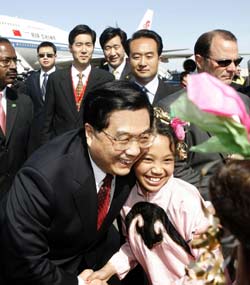
Chinese President Hu Jintao arrived in Seattle,
Washington State yesterday, kicking off his first state visit to the United
States. -Xinhua
Chinese President Hu Jintao arrived in Seattle, Washington State yesterday,
kicking off his first state visit to the United States.
Seattle, the first stop of the Chinese president's four-day U.S. trip, is a
commercial, cultural and advanced technology hub of the US Pacific Northwest and
a major port city for trans-Pacific and Asian trade.
In Seattle, President Hu is expected to meet local officials, tour Microsoft
and Boeing facilities, and give a public address.
In his written statement delivered upon arrival at the airport, Hu said he is
delighted to visit the United States at the invitation of U.S. President George
W. Bush and he wishes to extend, on behalf of the Chinese people, his warm
greetings and best wishes to the American people.
He said Washington State and Seattle, known as the Evergreen State and
Emerald City and renowned for their beautiful environment and dynamic economies,
have served as important American gateways to China and the rest of Asia.
In recent years, Hu said, economic exchanges and mutually beneficial
cooperation between China and Washington State as well as Seattle have
registered rapid expansion, contributing to the overall growth of China-U.S.
relations and friendly exchanges between the two peoples.
He said China and the United States, as two great nations, "share broad
common interests, have a solid foundation for cooperation and shoulder joint
responsibility for promoting world peace and development."
"A healthy, stable and ever-growing China-U.S. relationship will both benefit
the two peoples, and enhance peace, stability and prosperity in the Asia Pacific
and the world at large," said Hu in the statement.
The Chinese president said that thanks to joint efforts by the two countries,
the China-U.S. relationship enjoys "sound momentum of growth."
"I look forward to meeting with President Bush and exchanging views with him
on bilateral relations and major issues bearing on our common interests," Hu
said. "I will also have extensive contacts with the American people to enhance
mutual understanding and friendship between our two peoples."
Hu said he is confident that his visit will boost the growth of the
constructive cooperative relationship between China and the United States.
In his visit to Seattle, Washington D.C. and Yale University, President Hu
will meet U.S. Congress members, officials, scholars, workers and students as
well, Chinese Vice Foreign Minister Yang Jiechi said last Friday.
Yang said President Hu and President Bush and other U.S. leaders would
exchange views on bilateral relations and major international and regional
issues of common concern in a "profound way."
"We hope that Hu's visit will encourage both sides to examine the importance
and necessity of developing the Sino-U.S. relations from a strategic height and
long-term perspective," he said.
On Wednesday, the Chinese president will leave Seattle for Washington to have
talks with Bush at the White House on Thursday.Hu is expected to give a speech
at Yale University on Friday.
In recent years, China-U.S. relations have, on the whole, maintained a
momentum of development. The two countries have effectively cooperated in trade,
anti-terrorism, law enforcement, nonproliferation, infectious disease control,
science and technology, education and other areas.
The two countries have coordinated their positions in international and
regional affairs such as the nuclear issue on the Korean Peninsula, the Iranian
nuclear issue, the reconstruction of Iraq and United Nations affairs.
Trade forms an important part of China-U.S. relations. In 2005, bilateral
trade between China and the United States rose to 211.63 billion U.S. dollars,
an increase of more than 86 times over 1979, when the two countries established
diplomatic relations.
China has become the third largest trading partner and the fourth largest
export market for the United States, which in turn, is now China's second
largest trading partner, with bilateral trade rising 27.4 percent annually
between 2001 and 2005.
To date, U.S. companies have invested in nearly 50,000 projects in China with
an accumulated actual investment of over 50 billion dollars, and in 2004, U.S.
companies recorded a sales volume of more than 75 billion dollars.
Chinese Foreign Ministry spokesman Liu Jianchao said last week that the goal
of Hu's U.S. visit is to enhance exchanges and mutual trust and expand consensus
and cooperation so as to jointly promote the China-U.S. constructive cooperative
relations.
"I hope and believe that the Chinese president's visit will further boost the
development of China-U.S. relations," Liu said.
After concluding his U.S. trip on Friday, President Hu will continue his
five-nation tour, which will also take him to Saudi Arabia, Morocco, Nigeria and
Kenya.



